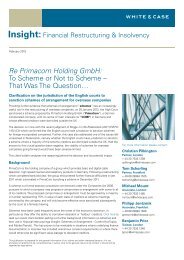Mexican Legal Framework of Business Insolvency - White & Case
Mexican Legal Framework of Business Insolvency - White & Case
Mexican Legal Framework of Business Insolvency - White & Case
Create successful ePaper yourself
Turn your PDF publications into a flip-book with our unique Google optimized e-Paper software.
Conditioning the application <strong>of</strong> cross-border cooperation provisions to international<br />
reciprocity is a novelty <strong>of</strong> the <strong>Insolvency</strong> Law, as it is not found in the Model Law.<br />
Reciprocity can be defined as the term attributed to the custom <strong>of</strong> a state granting<br />
another state a like treatment to the one the former receives from the latter, in a<br />
specific issue <strong>of</strong> international cooperation. 64 The reciprocity requirement can be seen<br />
from two different angles: (1) positive (or specific) reciprocity; or (2) negative (or diffuse)<br />
reciprocity. Positive (or specific) reciprocity would require an enacting state<br />
to have affirmative evidence <strong>of</strong> reciprocity from another state; while negative (or diffuse)<br />
reciprocity would require absence <strong>of</strong> evidence that another state would<br />
refuse reciprocity.<br />
Given Mexico’s international cooperation tradition in other areas, it is reasonable<br />
to conclude that the position Mexico has taken adheres to the negative (or diffuse)<br />
reciprocity test. That is, the cross-border cooperation provisions would apply and Mexico<br />
would recognize a foreign proceeding and grant a foreign representative access to<br />
<strong>Mexican</strong> courts and proceedings, etc., unless there is evidence that another state would<br />
not recognize a <strong>Mexican</strong> concurso and grant a <strong>Mexican</strong> representative access to its<br />
courts and proceedings, etc. ALI Mexico (2003) considers that reciprocity would exist<br />
regarding states that incorporate the Model Law into their legal systems. 65 An unrelated<br />
precedent illustrates Mexico’s position in connection with reciprocity, taking a negative<br />
(or diffuse) reciprocity position:<br />
INHERITANCE. WHOEVER INTENDS TO EXCLUDE A FOREIGN-BORN INDIVIDUAL<br />
SUCCESSOR HAS THE BURDEN TO PROVE FOREIGN LAW AND LACK OF RECIPROCITY.<br />
According to Article 86 bis <strong>of</strong> the Federal Code <strong>of</strong> Civil Procedures and 284 bis <strong>of</strong> the Code <strong>of</strong><br />
Civil Procedures for the Federal District, the party invoking the application <strong>of</strong> foreign law must<br />
invoke it. Lack <strong>of</strong> international reciprocity cannot derive from scattered provisions <strong>of</strong> foreign<br />
law, therefore it is insufficient to simply gather a partial copy <strong>of</strong> a foreign civil code; likewise,<br />
64 IIJ (2002), p. 53, Book VI.<br />
65<br />
P. 309.<br />
<strong>White</strong> & <strong>Case</strong><br />
89
















